The Philippines' geographic location plays a crucial role in shaping its foreign policy, making it a vital gateway between the Western Pacific and Southeast Asia. Its proximity to key sea routes and the South China Sea increases its strategic importance, especially in the context of U.S.-China power competition.
This strategic placement creates two major challenges: vulnerability to territorial integrity threats and environmental security issues. For instance, the Philippines faces tensions with China over disputed territories in the South China Sea, which can compromise its sovereignty. At the same time, its location makes it prone to natural disasters and climate change.
Despite these challenges, the Philippines' geographic location also presents opportunities. Its strategic placement enables economic cooperation with neighboring countries, such as trade agreements and infrastructure investments.
Additionally, it offers opportunities for military modernization, as the country can engage in joint military exercises and defense cooperation with major powers like the U.S.
To navigate these complexities, the Philippines must balance its relations with major powers like the U.S. and China while addressing internal security challenges. This delicate balancing act is essential for the country's growth, influence, and stability.
Historical Context of Philippine Diplomacy
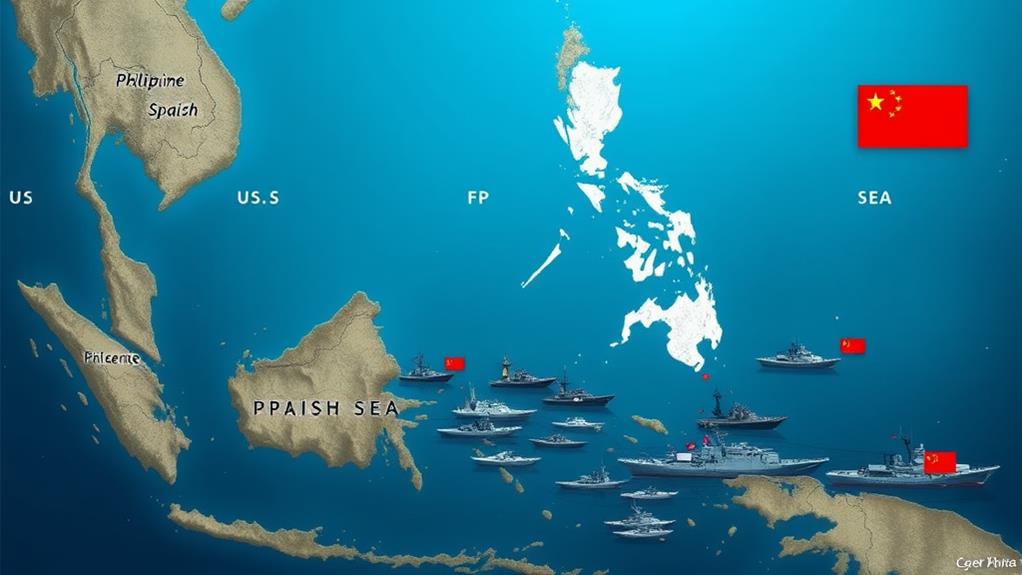
The historical context of Philippine diplomacy is deeply rooted in the country's complex colonial past and its subsequent struggles for independence.
The Philippines was a Spanish colony from the 16th century to 1898, which had profound impacts on the country's culture, politics, and international relations. This long period of Spanish rule shaped the nation's identity and influenced its relationships with other countries.
For example, the Battle of Bataan reflects the nation's fight for freedom, showcasing the resilience and determination of the Filipino people.
The Spanish-American War in 1898 marked a significant turning point, as Spain ceded the Philippines to the United States through the Treaty of Paris. This transfer of power led to the Philippine-American War (1899-1902), where Filipino nationalists, led by Emilio Aguinaldo, fought for independence rather than accept American colonial rule.
This conflict set the tone for future diplomatic endeavors, highlighting the tensions between colonial legacy and nationalist aspirations.
The Philippines eventually gained independence on July 4, 1946, but this came with its own set of complexities, including the influence of the United States and the post-World War II geopolitical landscape.
The country's foreign policy has since been shaped by its relationships with regional neighbors, the United States, and more recently, China.
The historical backdrop continues to influence Philippine foreign policy, reflecting an ongoing balance between independence and strategic alliances.
Geopolitical Significance of the Philippines
The Philippines' strategic location underscores its significant geopolitical role. Situated at the outer rim of maritime Southeast Asia, the Philippines acts as a crucial gateway between the Western Pacific and the rest of Asia. This geographic positioning places the country at the center of critical sea routes and sea lines of communication (SLOC), making it a vital player in Indo-Pacific affairs.
The country's diverse ecosystems, including natural wonders like the Puerto Princesa's Underground River, further emphasize its unique geographic and ecological significance. This attracts global attention and promotes tourism.
The Philippines' proximity to key maritime features like the South China Sea amplifies its geopolitical importance. This sea hosts major global shipping lanes and valuable resources, drawing the attention of multiple regional and global powers, including China, the United States, and Japan.
The ongoing territorial disputes in the South China Sea, involving the Philippines, China, and other Southeast Asian nations, highlight the country's sensitive position in this region.
To navigate its complex relationships, the Philippines must balance its need for economic cooperation with its commitment to national sovereignty and security. This delicate balance is essential for the country's continued growth and influence in the region.
Regional Security Challenges
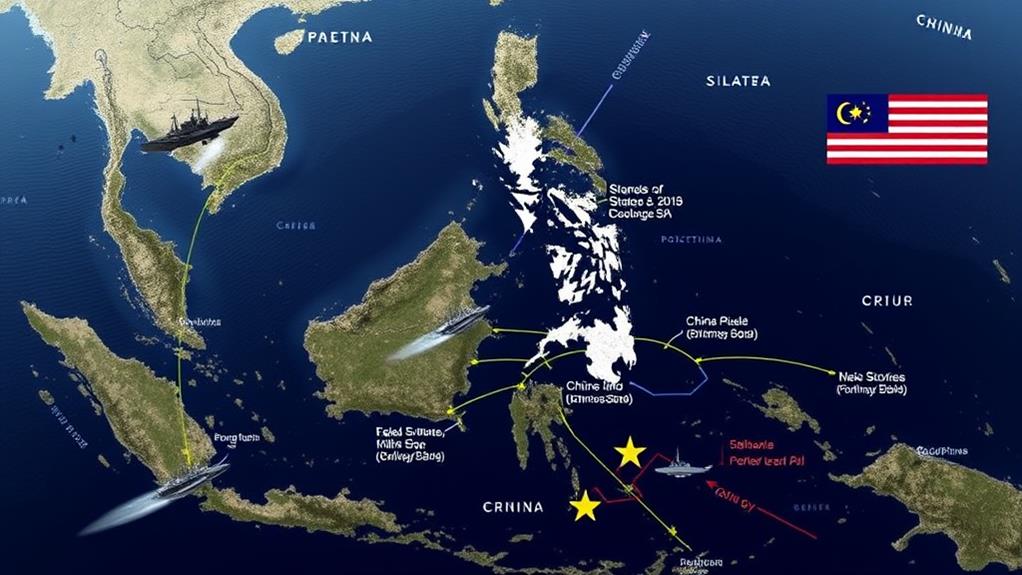
Regional Security Challenges in the Philippines
The Philippines faces significant regional security challenges due to its strategic location and complex relationships with neighboring countries.
Threats to Territorial Integrity and Sovereignty
As an archipelagic nation, the Philippines is vulnerable to threats to its territorial integrity and sovereignty, particularly in the South China Sea.
China's aggressive actions pose a constant challenge to Philippine maritime claims and security. The dispute highlights the importance of protecting the country's maritime borders and resources.
Environmental Preservation and National Security
The Philippines is home to unique ecosystems and biodiversity, such as the Puerto Princesa's Underground River.
Environmental preservation is crucial to national security as it directly impacts the country's economic development, food security, and human well-being.
Great Power Rivalries and Regional Diplomacy
The Philippines must navigate the complexities of great power rivalries, particularly the U.S.-China competition, which adds tension to the regional landscape.
Balancing relationships with key allies like the United States while maintaining regional diplomacy efforts through ASEAN is crucial to maintaining regional stability.
Internal Security Issues
Internal security issues, such as terrorism, communist insurgency, and domestic conflicts, also pose significant threats to national security.
The country's extensive porous maritime borders make it vulnerable to illegal activities, including the entry of small arms, contraband, and illegal migrants.
Addressing Security Challenges
To address these challenges, the Philippine government is modernizing its defense capabilities, enhancing maritime domain awareness, and strengthening cooperation with other countries to achieve collective deterrence.
This strategic approach aims to ensure the country's safety and stability in a dynamic and increasingly uncertain regional environment.
Relations With the United States
The Philippines has maintained a strong alliance with the United States, rooted in their shared colonial past and continued cooperation in addressing contemporary security challenges.
Mutual Defense Treaty: The Philippines and the US are bound by a treaty that guarantees mutual defense in the event of an armed attack on either party. This treaty enhances the Philippines' security against external threats.
The US provides significant military aid and training to the Philippines, which has been crucial in modernizing the Armed Forces of the Philippines. For instance, the US has provided funding and expertise to enhance the Philippines' maritime security capabilities. This cooperation has enabled the Philippines to better address internal and external security challenges.
The partnership with the US also helps the Philippines maintain stability in the Indo-Pacific region. Specifically, the US has supported the Philippines in countering China's assertive territorial claims in the South China Sea. This cooperation has contributed to the Philippines' ability to protect its sovereignty and territorial integrity.
These elements highlight the enduring nature of US-Philippines relations, which continues to play a central role in shaping the Philippines' foreign policy and security strategies.
Engagement With China
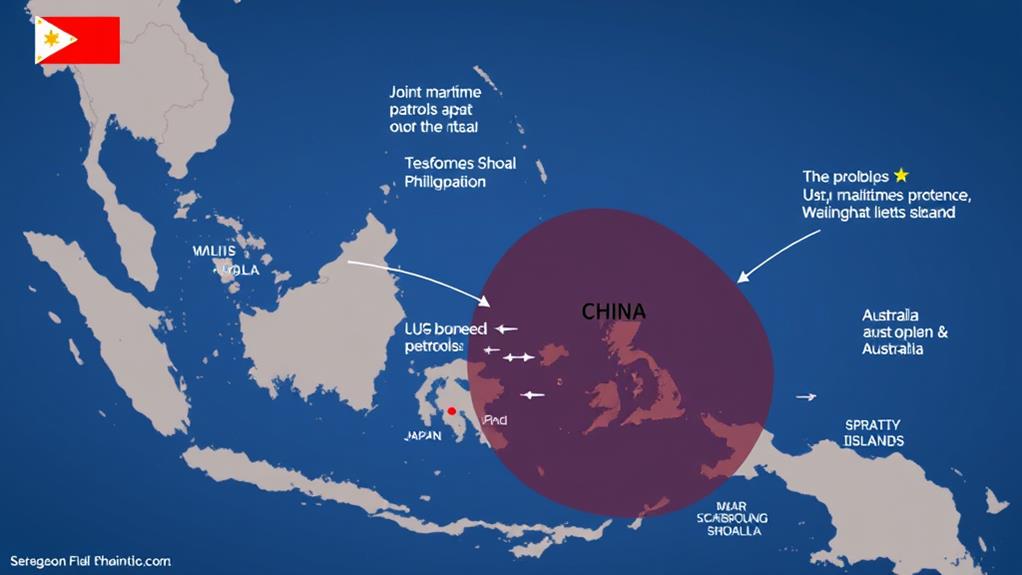
Engagement with China: A Delicate Balance
The Philippines must navigate its complex relationship with China, a nation with significant economic influence and assertive actions in the South China Sea that impact Philippine territorial integrity and sovereignty.
Key Aspects of Philippine-China Relations
Economic Cooperation: The Philippines has signed bilateral agreements with China on infrastructure, 5G connectivity, and investment pledges, resulting in significant economic gains and potential for leverage.
Security Dynamics: Annual Defense Security Talks have been established, but grey-zone coercion in the West Philippine Sea has heightened tensions and security risks.
Public Perception: Filipinos have a low trust rating towards China, driven by concerns over its intentions, making it challenging to sustain public support.
Diplomatic Efforts: Direct communication lines have been established, and efforts have been made to resolve 'misinterpreted' statements, potentially leading to improved dialogue and cooperation.
Geopolitical Context: The Philippines' strategic location amid US-China power competition has enhanced its geopolitical significance.
To navigate this complex relationship, President Ferdinand Marcos Jr has sought to bolster cooperation while addressing China's increasing assertiveness.
This approach involves leveraging economic ties while maintaining strategic partnerships with other key players like the United States and Japan.
Diplomatic Ties With Other Nations
The Philippines' diplomatic ties with other nations are crucial for its strategic positioning in Southeast Asia. The country's location makes it a significant player in the region. Its rich cultural heritage, including the Ifugao Rice Terraces, also enhances its soft power in international relations.
The Philippines maintains a strong alliance with the United States, its most significant security partner. This relationship is rooted in historical ties, with the Philippines being the only former U.S. colony in Southeast Asia. The alliance includes extensive military cooperation and economic support, which are vital for the Philippines' national security and economic development.
Japan has been a key partner in the Philippines' economic development, with infrastructure investments and support for peace and security in the region. Japan's quiet but steadfast support has provided a buffer against authoritarian neighbors and has been instrumental in maintaining stability, particularly in Mindanao.
The Philippines actively engages with regional and global organizations, including ASEAN, APEC, and the United Nations. This broad engagement helps the country leverage its unique strategic geography and navigate the complex geopolitics of the Indo-Pacific region.
These diverse diplomatic ties enable the Philippines to balance its relations with major powers while advancing its own national interests.
Internal Security Considerations
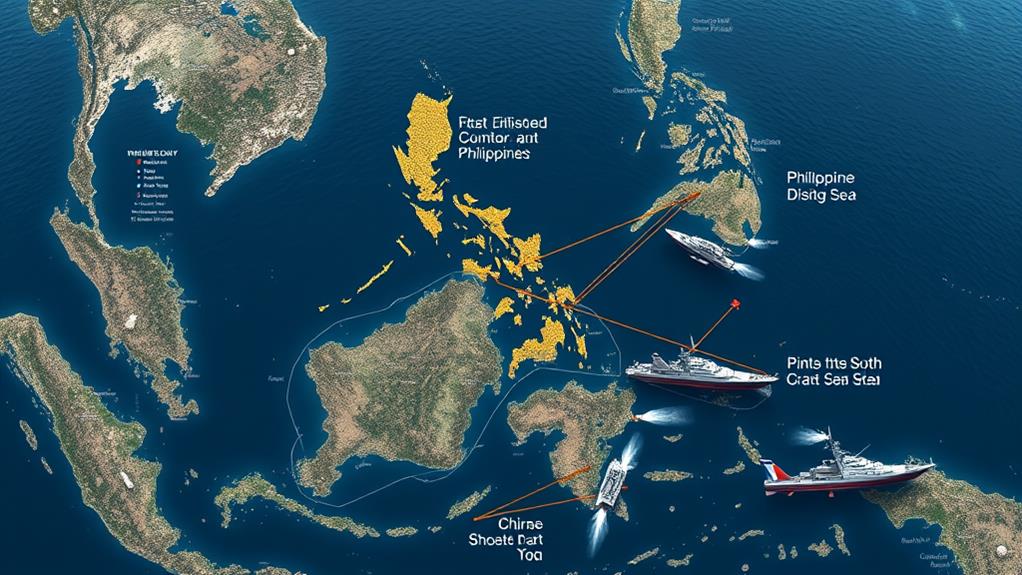
Internal Security Considerations
Stability within its borders is crucial for the Philippines' foreign policy. The country's complex internal security landscape, shaped by its rich cultural diversity, has historically contributed to internal tensions and conflicts. For instance, the southern region of Mindanao is home to various indigenous tribes, which has led to ongoing challenges posed by internal threats such as communist guerrillas and Moro separatist movements.
The peace process with the Moro Islamic Liberation Front (MILF) is a significant focus. The establishment of the Bangsamoro Autonomous Region in Muslim Mindanao marks a crucial milestone in reducing internal conflict. This region's unique cultural heritage, including festivals like the Kadayawan Festival, plays a role in fostering community spirit and promoting peace among diverse groups.
Internal security is intricately linked to external security and foreign policy. The Philippines' ability to manage its internal threats effectively impacts its capacity to engage in regional and global affairs.
A stable domestic environment allows the government to redirect resources towards external defense and diplomacy, enabling the country to navigate the intense great power rivalry between the US and China more effectively.
Internal security influences the Philippines' geopolitical positioning. The need to address internal instability can drive the country's strategic alliances and military modernization efforts, as seen in recent trilateral cooperation with the US and Japan.
Thus, internal security considerations remain a vital aspect of Philippine foreign policy, shaping the country's approach to regional security and international relations.
How Does the Involvement of the United States Impact Philippine Foreign Policy?
The role of us in philippine geopolitics has a significant impact on the country’s foreign policy. The United States’ involvement influences the Philippines’ stance on crucial issues, economic ties, and military cooperation. The partnership shapes the regional power dynamics and plays a major role in shaping Philippine diplomatic strategies.
Economic and Strategic Partnerships
Effective Internal Security Enables Robust Partnerships
The Philippines' ability to manage internal security effectively allows it to focus on building strong economic and strategic partnerships, crucial for achieving its foreign policy objectives.
These partnerships are vital for leveraging resources, enhancing security, and promoting economic development. The country's unique geography also plays a significant role in its military and defense strategies.
Balanced Approach to Major Power Relations
Under President Ferdinand Marcos Jr., the Philippines has adopted a balanced approach to its relationships with major powers like the United States, Japan, and China.
This approach aims to maximize economic and security benefits without overreliance on any single power.
Strengthened Alliance with the United States
The Philippines has strengthened its alliance with the U.S. through agreements such as allowing U.S. access to additional military bases and conducting significant joint military exercises.
This cooperation also extends to economic areas like high-quality infrastructure and 5G connectivity.
Closer Strategic Partnerships with Japan
The country has sought closer strategic partnerships with Japan, including agreements on defense equipment and technology transfer, as well as humanitarian assistance.
Discussions on military interoperability and potential arms transfers are also underway.
Economic Cooperation with China
Despite tensions, the Philippines has engaged in economic cooperation with China, securing investment pledges and infrastructure financing.
Annual defense security talks and direct communication between foreign affairs establishments have been established to manage relations effectively.
Strategic Hedge Approach
These diverse partnerships reflect the Philippines' strategic hedge approach, aiming to maintain favorable relations with multiple powers while ensuring national interests are protected.
Future Directions in Foreign Policy
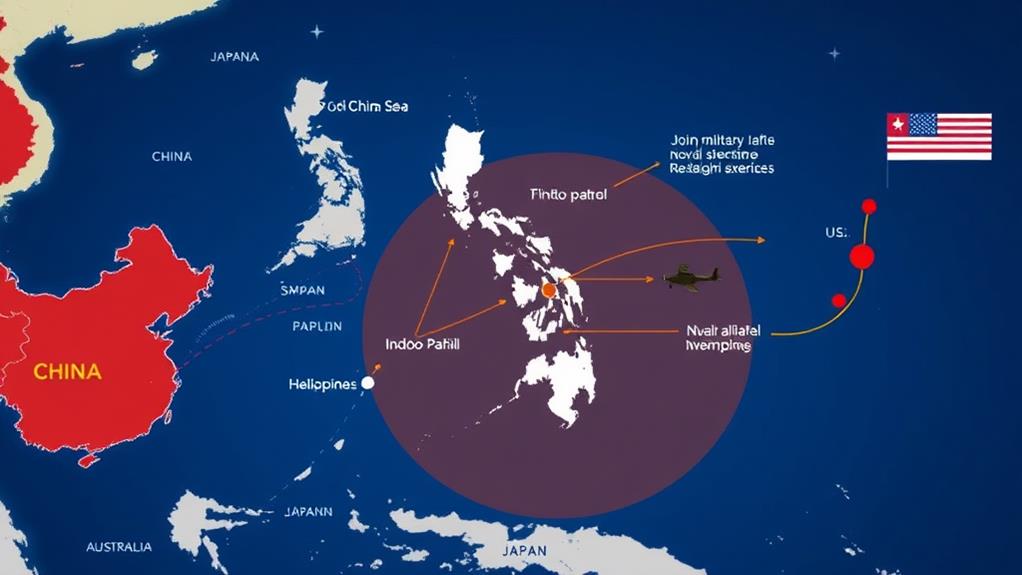
The Philippines' future foreign policy directions will rely on balancing economic and security interests.
The country's strategic location at the outer rim of maritime Southeast Asia, near critical sea routes and sea lines of communication, makes it significant in regional geopolitics.
Historically, the Philippines has utilized its geographic advantages, like the ancient trade routes along the Pasig River, to facilitate commerce and cultural exchange.
Under President Ferdinand "Bongbong" Marcos Jr., the Philippines is adopting a flexible foreign policy, aiming to avoid armed conflicts and pursue cooperation while promoting national interests. This approach is similar to the 'friendly to all and enemy to none' mantra of his predecessor, Rodrigo Duterte, but with a greater emphasis on diplomatic negotiations and consultations.
The Marcos Jr. administration prioritizes safeguarding the Philippines' territorial integrity and sovereignty, particularly in the West Philippine Sea, while maintaining ties with both the United States and China.
The Three Pillars of Philippine Foreign Policy – protecting territorial integrity and sovereignty, promoting economic development, and safeguarding overseas Filipinos – remain guiding principles.
Balancing relationships with the US and China is crucial, as the Philippines seeks to leverage its alliances to ensure national security and economic growth amidst the intensifying US-China power competition.
This balanced approach will enable the country to navigate the evolving geopolitical landscape effectively.
Questions and Answers
How Does the Philippines Balance Its Economic Ties With China and Security Ties With the Us?
The Philippines must navigate complex geopolitical dynamics to balance its economic ties with China and security ties with the US.
The Philippines relies heavily on China for trade, with China being its top trading partner. In fact, in 2020, China accounted for 23.4% of the Philippines' total trade. This significant economic relationship is crucial for the Philippines' growth and development.
However, due to South China Sea tensions, the Philippines has strengthened its security alliance with the US. The country has emphasized economic cooperation with the US to offset potential military conflicts.
For instance, in 2020, the Philippines and the US signed a deal to increase US investment in the Philippines' energy sector. This approach allows the country to maintain robust economic relations with China while securing strategic support from the US.
What Role Do Internal Conflicts Play in Shaping Philippine Foreign Policy?
Internal conflicts significantly influence Philippine foreign policy decision-making.
The president, domestic institutions, and public opinion interact to shape foreign policy. For instance, the Philippine Constitution requires Senate approval for military agreements, which can constrain the president's foreign policy initiatives.
Furthermore, public perception plays a crucial role, as public distrust of China complicates stronger ties with Beijing.
Similarly, local opposition to US military presence can hinder security cooperation with the US.
How Do Demographic Factors Influence the Philippines' International Relations?
Demographic factors significantly influence the Philippines' international relations. The country's large and young population, with 28% between 10-24 years old, presents both opportunities and challenges.
On one hand, this demographic fuels economic growth through a robust labor market and remittances from overseas workers. For instance, the Philippines has become one of the top recipients of remittances globally, with a significant portion of its GDP coming from overseas Filipino workers.
On the other hand, this demographic also strains domestic resources and stability. The large population puts pressure on the country's infrastructure, education, and healthcare systems, which can lead to social unrest and instability.
These demographic dynamics influence the Philippines' ability to engage in regional security partnerships and economic agreements. For example, the country's large workforce can be an attractive asset for foreign investors, but only if the government can ensure stability and security.
Therefore, internal stability and peace processes, such as in Mindanao, remain crucial for leveraging these demographic advantages effectively.
Can the Philippines Maintain Neutrality in the Us-China Power Competition?
The Philippines faces significant challenges in maintaining neutrality in the US-China power competition. Its strategic location in the Asia-Pacific region and historical ties with the US make it difficult for the country to remain neutral.
For instance, the Enhanced Defense Cooperation Agreement (EDCA) with the US indicates a shift away from neutrality, as it allows the US to increase its military presence in the Philippines.
The country's need for security and economic cooperation with both the US and China complicates its ability to remain neutral. The Philippines requires cooperation with both powers to address its security concerns, such as the South China Sea disputes, and to boost its economy through trade and investment.
This complex situation makes strategic ambiguity a more pragmatic approach for the Philippines, allowing it to maintain good relations with both the US and China without fully committing to either side.
What Impact Does the Philippines' Geopolitical Position Have on Its Economic Growth?
The Philippines' strategic location in Southeast Asia positively impacts its economic growth. This position facilitates trade with major economies, such as the United States, Japan, and China, which are among the country's largest trading partners.
The trilateral partnerships with the U.S. and Japan, for instance, enhance economic and security cooperation, driving growth and investment.
However, this position also exposes the Philippines to regional tensions, particularly with China. The country's proximity to the disputed South China Sea, where China has territorial claims, can impact stability and investment confidence.
Effective management of these dynamics is crucial for sustained economic expansion.